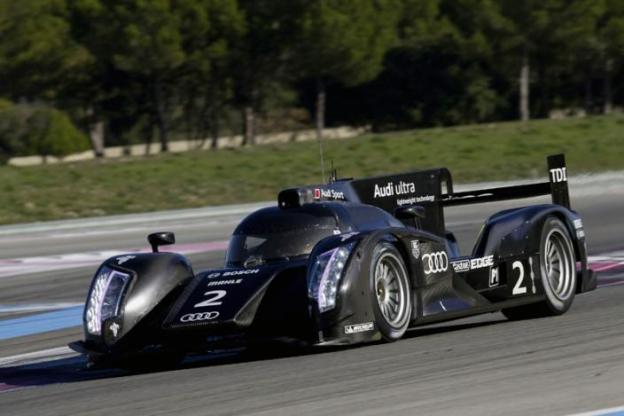
In racing, Audi is a bit of an overachiever. The German carmaker has won the 24 Hours of Le Mans endurance race 10 times since 2000. In 2006, it became the first to win with a diesel powered car. Not content to rest on its laurels, Audi is competing at Le Mans with a hybrid in 2012.
The new racer is being kept under wraps until its formal unveiling at the end of the month, but Audi indicated that it will be based on the R18 TDI that won the 2011 race, with an electric motor assisting the 3.7-liter turbodiesel V6. Road & Track claims Audi might be using a flywheel recovery system instead of batteries. This system uses a spinning flywheel to store electricity and was first used on the Porsche 911 GT3 R Hybrid racer. Audi will field a total of four cars, two hybrids and two diesels.
The Audis won’t be the only hybrids on the starting grid: Toyota, which last raced at Le Mans in 1999, is entering one of its own. The TS030 Hybrid is powered by a normally aspirated 3.4-liter gasoline V8 and an electric motor, with a capacitor designed to harness braking energy to give the car an extra boost of power when exiting corners. Toyota will send two TS030s to Le Mans.

Why hybrids? Besides the aforementioned power-boost trick, a hybrid will be more fuel efficient, something even racers need to think about. The less time a car spends in the pits, the less time competitors have to catch up. This is why Audi has been using diesels since 2006. The TS030’s batteries will allow it to run on electric power in low-speed situations, such as driving down the pit lane.
Hybrid race cars are also important in terms of public relations. While race cars have very little in common with showroom models, manufacturers still like to use racing to show off their technical abilities. An exercise like this also gives the carmakers some green credentials with customers; a sleek race car will look great next to a Prius on an auto show stand.
This will be more than a PR stunt, though. Audi’s R18 hybrid is based on a race-winning chassis and since Audi’s main rival, Peugeot, won’t be competing, it is basically unchallenged. It seems very likely that an Audi will win. The only question is whether it will be one of the hybrids or one of the conventional diesels. Toyota is an unknown quantity, a new team with a new car, so it is hard to predict how the Japanese company will do.
The first outing for both cars will be the six hour endurance race at Spa-Francorchamps in Belgium on May 5. They will then compete at Le Mans on June 16 and 17.
Editors' Recommendations
- 2022 Toyota Tundra hybrid first drive review: New dog, old tricks
- 2021 Toyota Prius vs. 2021 Toyota Prius Prime
- 2020 Audi A8 gains plug-in hybrid powertrain, sporty S8 model
- Toyota gives its sweet, race-ready Supra the green flag for production
- Everything You Need to Know About Audi MMI in 2019


